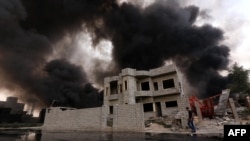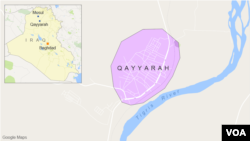Part of the Islamic State terror group’s plan to turn the northern Iraqi city of Mosul into “hell on earth” could well include a barrage of homemade chemical weapons.
U.S. military officials fully expect IS militants to unleash their chemical weapons arsenal as Iraqi and Kurdish forces advance on the self-declared caliphate’s Iraqi capital.
“This is real. They’re dead set on it,” Pentagon spokesman, Capt. Jeff Davis told reporters Monday, saying the military has documented at least a couple of dozen instances in which IS has used or tried to used chemical weapons.
“As this road toward Mosul progresses, ISIL is like to try to use it again,” Davis said, using an acronym for the terror group.
So far, from a tactical standpoint, Davis says the impacts of the use of IS chemical weapons have not been “militarily significant.”
“It’s not generally in a lethal concentration,” he said. “It’s more of an irritant than anything else.”
Many of the IS chemical weapons attacks have involved the use of what the Pentagon describes as a mustard agent, a powder bound together with oil and then placed in a rocket or a mortar shell.
While the resulting explosion can allow the mustard agent to cause harm, Pentagon officials say it is nowhere near as deadly as mustard gas, used to deadly effect during World War I.
Mustard gas, according to the Organization for the Prohibition of Chemical Weapons (OPCW), can cause burns and blisters on the skin but will also damage the eyes, lungs and other internal organs.
Preparing for an attack
Despite the Islamic State’s lack of tactical success with chemical weapons, the U.S. is taking the threat seriously.
The Pentagon says all U.S. personnel deployed to the region have been given training and equipment to protect themselves from possible chemical weapons attacks.
U.S.-backed forces are also getting help.
The Pentagon says it has distributed 40,000 gas masks to Iraqi Security Forces brigades and another 1,500 to Iraq’s elite Counter Terror Service.
U.S.-backed Peshmerga have also received 9,000 gas masks, part of a $415 million aid package that also covered stipends and other costs.
“We want to make sure that the Iraqi Security Forces and the Peshmerga have the ability to detect this and to defend against it,” said the Pentagon’s Davis.
The U.S. and its coalition partners have also taken steps to stagnate IS’ nascent chemical weapons program.
At least twice in the past month, coalition airstrikes have targeted IS chemical weapons facilities.
On Saturday U.S. Central Command announced a strike near Qayyarah, south of Mosul, which destroyed an IS “chemical weapons factory."
Another strike, announced on September 15, targeted what CENTCOM described as a chemical weapons storage facility near Al Huwayjah, Iraq.
Earlier this month, U.S. officials also described airstrikes against a former pharmaceutical plant complex near Mosul, after intelligence indicated IS had converted it into a chemical weapons production facility.












